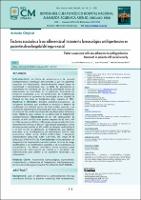| dc.contributor.author | Pocohuanca Ancco, Lucy | |
| dc.contributor.author | Villacorta, Juan | |
| dc.contributor.author | Hurtado Roca, Yamilée | |
| dc.date.accessioned | 2023-05-17T16:11:35Z | |
| dc.date.available | 2023-05-17T16:11:35Z | |
| dc.date.issued | 2021-12-14 | |
| dc.identifier.citation | Revista del Cuerpo Médico Hospital Nacional Almanzor Aguinaga Asenjo. 2021:14 (3). | es_PE |
| dc.identifier.issn | 2227-4731 | |
| dc.identifier.uri | https://hdl.handle.net/20.500.12959/3675 | |
| dc.description.abstract | Introducción: La falta de adherencia a la terapia antihipertensiva contribuye directamente a que los pacientes coexistan con hipertensión, desencadenando mayor riesgo de morbilidad y mortalidad. Así, la falta de adherencia al tratamiento se convierte en una de las principales causas de hipertensión no controlada en la población. Evaluamos los factores asociados a la no-adherencia al tratamiento antihipertensivo en pacientes de cardiología de un hospital de EsSalud en San Juan de Lurigancho-Lima, durante el 2017. Material y Métodos: Estudio analítico-transversal, se incluyeron pacientes que acudieron a consultorio externo de cardiología con historia previa de hipertensión esencial y se excluyeron hipertensión secundaria por otras causas biológicas. Se utilizó el Test de Morisky-Green Morisky Medication Adherence Scale (MMAS-4) para evaluar la no-adherencia al tratamiento antihipertensivo. Resultados: De los 270 participantes de estudio, el 69% (n=185) eran adultos mayores de 65 años, 46% (n=124) varones y el 76% (n=118) tenían pareja estable. Entre los antecedentes clínicos, el 60% (n=122) reportó diagnóstico clínico de hipertensión arterial, el 30% (n=80) de diabetes mellitus tipo II y el 27% (n=73) no-adherencia al tratamiento. Los factores asociados a la no-adherencia de tratamiento fueron sexo masculino (ORa: 0,45, IC95% 0,20-1,04), trabajador independiente (ORa:3,88, IC95% 1,51-9,97), IMC mayor de 30 (ORa:0,23, IC95% 0,07-0,70). Conclusiones: en los pacientes con diagnóstico de hipertensión esencial existen factores de riesgo modificables y no modificables asociados a la no-adherencia al tratamiento. Se deben considerar estos factores para implementar estrategias de tamizaje y focalizar las intervenciones para adherir a los pacientes renuentes a su tratamiento. | es_PE |
| dc.description.abstract | Background: Lack of adherence to antihypertensive therapy
contributes directly to patients coexisting with hypertension, uncontrolled hypertension in the population. We evaluated the factors associated with non-adherence to antihypertensive
treatment in cardiology patients of an EsSalud hospital in San Juan de Lurigancho-Lima, during 2017. Material and
Methods: Analytical-crossover study, patients attending cardiology outpatient clinic with previous history of essential
hypertension were included and secondary hypertension due to other biological causes were excluded. The Morisky-Green
Morisky Medication Adherence Scale (MMAS-4) was used to assess non-adherence to antihypertensive treatment. Results:
Of the 270 study participants, 69% (n=185) were adults older than 65 years, 46% (n=124) were male and 76% (n=118) had a
stable partner. Among the clinical history, 60% (n=122) reported clinical diagnosis of arterial hypertension, 30% (n=80) of
type II diabetes mellitus and 27% (n=73) non-adherence to treatment. Factors associated with non-adherence to treatment
were male sex (ORa: 0.45, 95%CI 0.20-1.04), self-employed (ORa:3.88, 95%CI 1.51-9.97), BMI greater than 30 (ORa:0.23,
95%CI 0.07-0.70). Conclusions: in patients with a diagnosis of essential hypertension there are modifiable and nonmodifiable
risk factors associated with non-adherence to treatment. These factors should be considered in order to
implement screening strategies and target interventions to adhere to treatment in reluctant patients. | es_PE |
| dc.format | application/pdf | es_PE |
| dc.language.iso | spa | es_PE |
| dc.publisher | Seguro Social de Salud (EsSalud) | es_PE |
| dc.relation.uri | http://cmhnaaa.org.pe/ojs/index.php/rcmhnaaa/article/view/1252 | es_PE |
| dc.rights | info:eu-repo/semantics/openAccess | es_PE |
| dc.rights.uri | https://creativecommons.org/licenses/by-nc-sa/4.0/ | es_PE |
| dc.subject | Tratamiento farmacológico | es_PE |
| dc.subject | Hipertensión | es_PE |
| dc.subject | Cumplimiento y adherencia al tratamiento | es_PE |
| dc.subject | Antihipertensivos | es_PE |
| dc.subject | Servicio de Cardiología en Hospital | es_PE |
| dc.subject | Perú | es_PE |
| dc.subject | Drug therapy | es_PE |
| dc.subject | Hypertension | es_PE |
| dc.subject | Treatment adherence and compliance | es_PE |
| dc.subject | Antihypertensive agents | es_PE |
| dc.subject | Cardiology Service | es_PE |
| dc.title | Factores asociados a la no-adherencia al tratamiento farmacológico antihipertensivo en pacientes de un hospital del seguro social | es_PE |
| dc.title.alternative | Factors associated with non-adherence to antihypertensive treatment in patients with social security | es_PE |
| dc.type | info:eu-repo/semantics/article | es_PE |
| dc.subject.ocde | https://purl.org/pe-repo/ocde/ford#3.02.04 | es_PE |
| dc.identifier.doi | https://doi.org/10.35434/rcmhnaaa.2021.143.1252 | |






